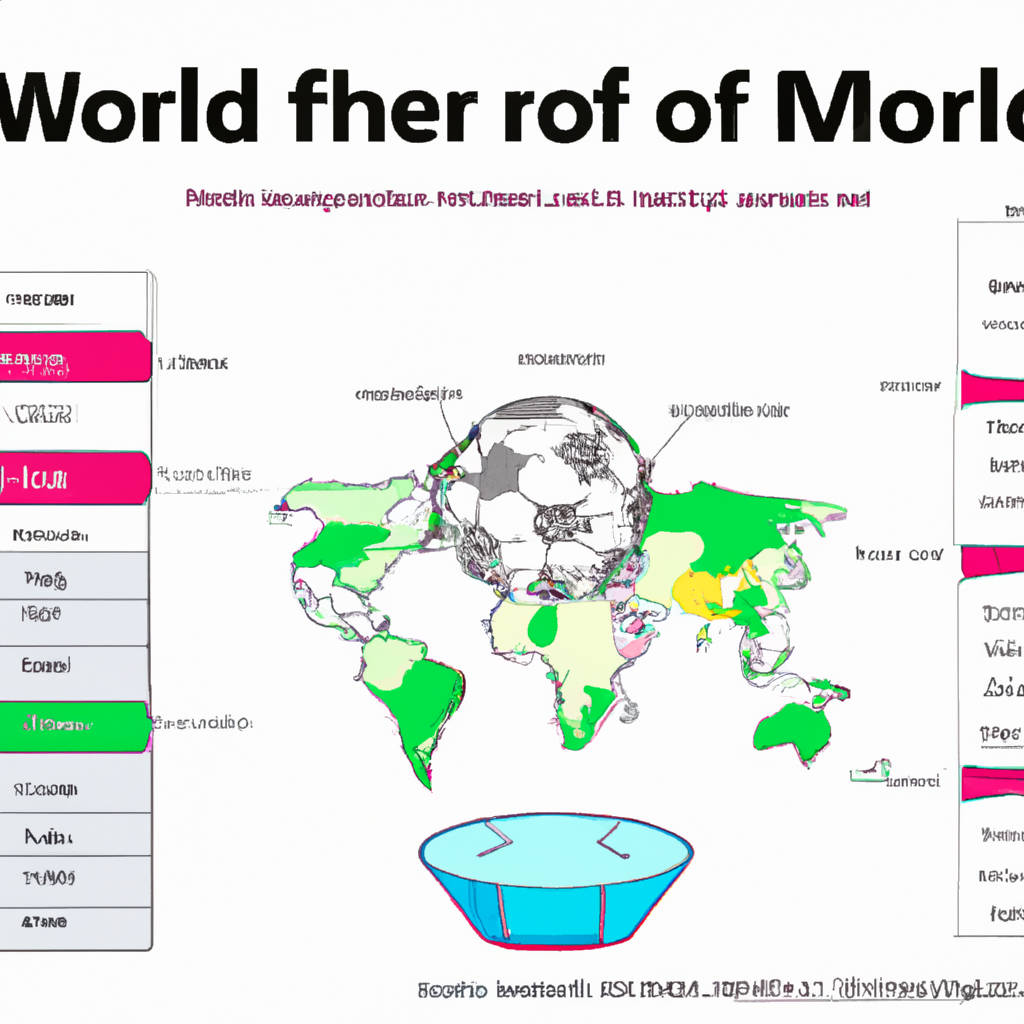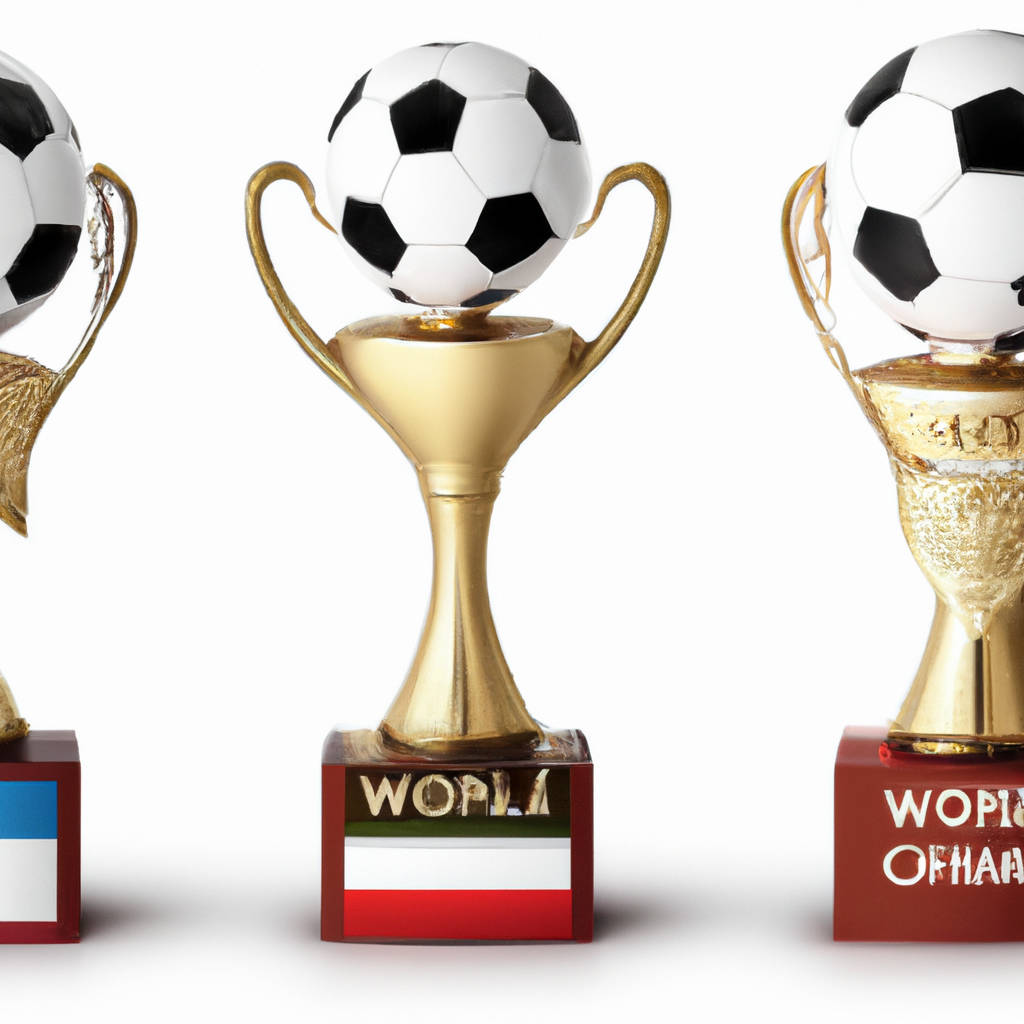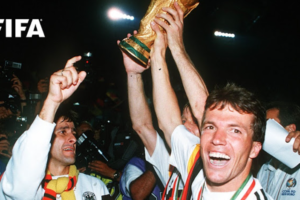The FIFA World Cup, known as the pinnacle of international football, is a global tournament that captivates the hearts and minds of millions of fans around the world. This prestigious event brings together teams from various nations, showcasing their skills and passion for the beautiful game. The tournament is held every four years, attracting immense attention and uniting people from different backgrounds in a shared love for football.
The World Cup is a celebration of diversity, as it welcomes teams from all corners of the globe. This tournament transcends language barriers, cultural differences, and political boundaries, creating a sense of unity and excitement among fans worldwide. It serves as a platform for players to represent their countries and compete at the highest level, showcasing their talents on the grandest stage.
The tournament’s history dates back to 1930 when the inaugural World Cup was held in Uruguay. Since then, it has grown exponentially, becoming one of the most-watched sporting events globally. Over the years, iconic moments have been etched into football folklore, with legendary players leaving their mark on the tournament’s history.
The World Cup is not merely a sporting event; it is a spectacle that captivates audiences with its dazzling displays of skill, teamwork, and passion. From the vibrant opening ceremony to the nail-biting final, every match is a testament to the dedication and hard work of the players and the unyielding support of their fans.
The tournament’s impact extends beyond the pitch, as it has the power to bring nations together and foster a sense of camaraderie. It inspires millions of aspiring footballers, ignites a sense of national pride, and fosters a global community united by their love for football.
In conclusion, the FIFA World Cup is an extraordinary event that showcases the best of international football. It represents the pinnacle of competition, unity, and passion, leaving a lasting impression on all those fortunate enough to witness it.

History of the FIFA World Cup
The FIFA World Cup, the pinnacle of international football, has a rich and captivating history that spans over nine decades. Since its inception in 1930, the tournament has evolved into a global phenomenon, capturing the hearts and minds of millions of fans worldwide. This prestigious event has not only showcased the talents of the world’s best footballers but has also become a platform for unity and celebration of the beautiful game.
The idea for the World Cup was conceived by Jules Rimet, the president of FIFA, who sought to establish a competition that would bring together nations from all corners of the globe. In 1928, FIFA officially announced its plans to organize an international football tournament, and two years later, the inaugural World Cup took place in Uruguay.
Thirteen teams participated in the first-ever World Cup, with Uruguay emerging as the victors. The tournament was a resounding success, attracting a staggering number of spectators and generating widespread excitement. Inspired by this triumph, FIFA decided to hold the competition every four years, allowing nations to showcase their footballing prowess on a global stage.
The early years of the World Cup were not without challenges. The tournament was suspended during World War II, with the next edition taking place in Brazil in 1950. This competition marked the introduction of a new format, where teams competed in a group stage followed by knockout rounds. The final match between Uruguay and Brazil, known as the “Maracanazo,” remains etched in football folklore as Uruguay secured a shocking victory on Brazilian soil.
As the World Cup grew in popularity, so did the number of participating teams. The tournament expanded gradually, accommodating more nations eager to showcase their footballing talent. In 1978, Argentina hosted the World Cup, and this edition saw the introduction of a second group stage, adding further excitement and drama to the competition.
The 1982 World Cup in Spain witnessed a watershed moment in the tournament’s history. This edition showcased some of the most scintillating football ever witnessed, with Brazil’s “Samba Boys” dazzling spectators with their attacking prowess. However, it was Italy who ultimately triumphed, displaying a blend of tactical brilliance and defensive solidity. This victory solidified Italy’s place among the elite nations in football history.
The World Cup continued to captivate audiences with its enthralling matches and unforgettable moments. The 1994 edition in the United States marked the first World Cup held outside of Europe and Latin America, highlighting the global reach and impact of the tournament. It also witnessed the rise of a new generation of footballing greats, such as Ronaldo, Romario, and Roberto Baggio.
With each passing tournament, the World Cup has become an arena for underdogs to shine and established powerhouses to assert their dominance. The 2002 edition in South Korea and Japan saw a stunning run from Senegal, who reached the quarterfinals in their debut World Cup appearance. Meanwhile, Brazil clinched their fifth title, solidifying their status as the most successful nation in World Cup history.
In recent years, the World Cup has undergone various changes, including an increase in the number of participating teams and a shift in hosting policies. The 2018 edition in Russia showcased the tournament’s ability to unite nations and bring people from diverse backgrounds together in the spirit of competition and camaraderie.
As we eagerly await the next iteration of the World Cup, it is impossible to ignore the impact this tournament has had on football and the world at large. The history of the FIFA World Cup is a testament to the power of sport to transcend borders, unite nations, and create lasting memories. From the humble beginnings of the inaugural tournament to the grand stage it occupies today, the World Cup continues to inspire and captivate football fans across the globe.
Format and Structure of the FIFA World Cup
The FIFA World Cup is undoubtedly one of the most anticipated and celebrated sporting events in the world. Every four years, nations from around the globe come together to showcase their skills, passion, and national pride on the football pitch. Beyond the exhilarating matches and unforgettable moments, the format and structure of the tournament play a crucial role in shaping the World Cup’s success.
The World Cup format has evolved over time to ensure fairness, competitiveness, and inclusivity. Currently, the tournament consists of 32 teams, selected through a rigorous qualification process. This process involves various regional competitions, where teams compete against one another to secure their spot in the prestigious event. The qualification process not only showcases the diversity of football talent worldwide but also provides an opportunity for smaller nations to participate and make their mark on the global stage.
Once the teams have qualified, they are divided into eight groups of four teams each. The group stage is a round-robin format where each team plays against all the others in their group. This format guarantees that each team has an equal opportunity to prove their worth, as they face a diverse range of opponents. The top two teams from each group advance to the knockout stage, while the remaining teams bid farewell to the tournament.
The knockout stage introduces a single-elimination format, adding an element of drama and intensity to the competition. The sixteen remaining teams battle it out in a series of knockout matches until only one team emerges as the champion. This format ensures that every match is a do-or-die situation, where the margin for error is minimal and the stakes are incredibly high.
To maintain a fair and balanced competition, FIFA has implemented various regulations regarding the structure of the tournament. One such regulation is the principle of geographical distribution. FIFA aims to ensure that teams from different continents have representation in the tournament, promoting diversity and giving equal opportunities to footballers from all corners of the world. This regulation prevents the dominance of a particular region and enhances the global appeal of the tournament.
Additionally, FIFA continuously strives to improve the World Cup format and structure to enhance the overall experience for players and fans alike. An example of this is the expansion of the tournament from 24 to 32 teams in 1998, allowing more countries to participate and increasing the level of competition. This expansion not only promotes inclusivity but also creates more excitement and anticipation around the event, as more nations have the opportunity to showcase their footballing prowess.
Moreover, the scheduling and timing of the World Cup also play a vital role in its format and structure. FIFA carefully selects the host country, taking into consideration factors such as infrastructure, weather conditions, and local support for the game. The tournament is typically held during the summer months, allowing fans to enjoy the matches in pleasant weather conditions. The scheduling also ensures that the World Cup does not clash with other major sporting events, allowing football to take center stage and captivate the global audience.
In conclusion, the format and structure of the FIFA World Cup are meticulously designed to ensure fairness, competitiveness, and inclusivity. From the qualification process to the knockout stage, every aspect of the tournament is carefully crafted to provide an unforgettable experience for players and fans alike. Through continuous improvements and adherence to regulations, FIFA maintains the integrity and prestige of this global sporting extravaganza. The World Cup format and structure truly embody the spirit of football, uniting nations and celebrating the beautiful game on a grand scale.

FIFA World Cup Records and Statistics
The FIFA World Cup is the pinnacle of international football, bringing together nations from around the globe to compete for the prestigious trophy. Over the years, this tournament has witnessed remarkable records and statistics that have shaped the history of the sport. From extraordinary goal-scoring feats to exceptional winning streaks, let’s delve into some of the most awe-inspiring achievements in World Cup history.
When it comes to goal-scoring records, the name that immediately comes to mind is Miroslav Klose. The German striker etched his name in the annals of football history during the 2014 World Cup when he surpassed Brazilian legend Ronaldo’s record of 15 goals to become the tournament’s all-time leading scorer. Klose’s remarkable feat of 16 goals in four World Cups showcases his consistency and goal-scoring prowess on the grandest stage of them all.
Another record that stands out is the most goals scored by a team in a single World Cup. This accolade belongs to Hungary’s “Magical Magyars” who, in the 1954 World Cup held in Switzerland, netted an astonishing 27 goals in just five matches. Led by the legendary Ferenc Puskás, Hungary’s attacking prowess overwhelmed their opponents, leaving a lasting impact on the tournament’s history.
On the other side of the spectrum, the record for the most goals conceded by a team in a single World Cup rests with Zaire, now known as the Democratic Republic of Congo. In the 1974 World Cup held in West Germany, Zaire’s defense leaked a staggering 14 goals in just three matches. This serves as a reminder of the challenges faced by smaller footballing nations when competing against more established teams.
In terms of winning streaks, it is hard to ignore the remarkable achievement of Brazil. The Seleção holds the record for the longest unbeaten run in World Cup history, going an astonishing 13 consecutive matches without a loss. This outstanding feat was achieved between the 1958 and 1970 World Cups, solidifying Brazil’s status as the most successful nation in the tournament’s history.
Furthermore, the fastest hat-trick in World Cup history deserves a special mention. This record is held by none other than Hungary’s László Kiss, who achieved the remarkable feat of scoring three goals in just seven minutes during a group stage match against El Salvador in the 1982 World Cup. Kiss’s incredible display of skill and efficiency remains etched in the memories of football fans worldwide.
Beyond individual and team records, the World Cup has also witnessed its fair share of statistical anomalies. One such example is the 1950 World Cup final between Uruguay and Brazil, commonly known as the “Maracanazo.” Despite Brazil being heavy favorites, Uruguay emerged victorious with a 2-1 scoreline. This shocking upset is often considered one of the biggest surprises in World Cup history and serves as a reminder that football is an unpredictable and captivating sport.
Lastly, the FIFA World Cup is not only about records and statistics but also about the moments that transcend the game itself. From Diego Maradona’s “Hand of God” goal to Roger Milla’s iconic celebrations, these unforgettable moments have become an integral part of the tournament’s legacy, creating lasting memories for fans across the globe.
In conclusion, the FIFA World Cup is a tournament that is rich in records and statistics. From goal-scoring exploits to extraordinary winning streaks, these achievements have shaped the history of the sport and created an enduring legacy. However, it is the moments that go beyond the numbers, the moments that capture the hearts of football fans worldwide, that truly make the World Cup a spectacle like no other.
FIFA World Cup Winners
The FIFA World Cup is the most prestigious international football tournament, captivating the attention of millions of fans around the globe. Every four years, teams from various countries compete fiercely to claim the ultimate prize, the World Cup trophy. Over the years, numerous nations have emerged victorious, etching their names in football history.
Brazil is undeniably the most successful country in World Cup history, having won the tournament a record-breaking five times. The Brazilian national team has a rich football legacy, with legendary players like Pelé, Zico, Romario, Ronaldo, and Ronaldinho gracing the field in their iconic yellow jerseys. Their skill, flair, and passion for the game have made them a force to be reckoned with on the international stage. From their first triumph in 1958 to their most recent victory in 2002, Brazil has consistently showcased their dominance and left an indelible mark on the World Cup.
Following closely behind Brazil is Germany, with four World Cup titles to their name. The German national team has long been known for their disciplined and organized style of play. Their meticulous approach to the game, coupled with a strong sense of teamwork, has enabled them to achieve remarkable success. Led by legendary figures such as Franz Beckenbauer, Gerd Muller, and Miroslav Klose, Germany has consistently displayed their tactical prowess and ability to perform under pressure. Their most recent triumph came in 2014 when they triumphed over Argentina in a thrilling final.
Italy, with four World Cup victories, also holds a prominent place in the tournament’s history. The Italian national team is renowned for their defensive prowess, often employing the legendary “catenaccio” system. This tactical approach, coupled with their technical abilities, has propelled them to success on multiple occasions. The likes of Giuseppe Meazza, Paolo Rossi, and Fabio Cannavaro have left an indelible mark on the World Cup with their performances, leading Italy to glory in 1934, 1938, 1982, and 2006.
Argentina, led by their talismanic captain and global icon Lionel Messi, has won the World Cup twice. Known for their attacking style of play and passion for the game, the Argentine national team has always been a formidable opponent. Diego Maradona, considered one of the greatest footballers of all time, inspired Argentina to victory in 1986 with his mesmerizing performances. In 1978 and 1986, Argentina lifted the World Cup, and their passionate fans celebrated these triumphs with immense joy and pride.
Other nations that have tasted World Cup glory include Uruguay, England, and France. Uruguay, the inaugural winners in 1930, have triumphed on one other occasion, in 1950. Boasting a rich footballing heritage, they have produced legendary players such as Alcides Ghiggia and Diego Forlán.
England, the birthplace of modern football, clinched their sole World Cup victory in 1966, thanks to the famous Wembley goal by Geoff Hurst. Led by inspirational figures like Bobby Charlton and Bobby Moore, England’s victory on home soil remains an iconic moment in football history.
France, the reigning World Cup champions, secured their second title in 2018, following their maiden triumph in 1998. Led by a talented generation of players including Zinedine Zidane, Thierry Henry, and Didier Deschamps, France showcased their flair and skill to the world, solidifying their status as a footballing powerhouse.
The FIFA World Cup winners represent the pinnacle of footballing excellence, showcasing the beauty, passion, and excitement of the game. These victorious nations have left an indelible mark on the tournament’s history, captivating fans with their extraordinary performances and legendary players. As the World Cup continues to evolve, new champions may emerge, but the legacy of these victorious nations will forever be etched in the annals of football history.

FIFA World Cup Legacy and Impact
The FIFA World Cup, undoubtedly the most prestigious and widely celebrated sporting event, leaves an enduring legacy and makes a profound impact on the host nation and the world at large. From the exhilarating matches that captivate billions of fans to the economic opportunities that arise, the World Cup brings nations together, inspires future generations, and leaves a lasting imprint on the host country’s culture, infrastructure, and economy.
One of the most significant legacies of the World Cup is the sense of unity and camaraderie it fosters among nations. During this grand tournament, people from diverse backgrounds and cultures come together to celebrate the beautiful game. The World Cup transcends political and social divides, creating a shared experience that unites countries around the globe. This unparalleled sense of unity extends beyond the tournament’s duration, leaving an indelible mark on international relations and promoting a spirit of cooperation and understanding long after the final whistle is blown.
Furthermore, the World Cup inspires and nurtures the dreams of aspiring athletes, kindling their passion for the sport and motivating them to pursue greatness. The tournament serves as a powerful platform for showcasing talent, allowing young players to witness the skills of their idols firsthand. The awe-inspiring performances on the pitch motivate future generations to take up the sport, fostering a culture of football and providing a pathway for talented individuals to aspire to international stardom. The memories and experiences gained during the World Cup become a source of inspiration for countless young athletes, driving them to push their limits and achieve their goals.
The economic impact of the World Cup on the host country cannot be overstated. The tournament attracts millions of tourists who spend money on accommodation, transportation, food, and merchandise, injecting a significant amount of revenue into the local economy. This influx of visitors stimulates various sectors, including hospitality, tourism, and retail, creating jobs and boosting economic growth. The construction of stadiums, transportation systems, and other infrastructure required for the World Cup also generates employment opportunities and leaves a lasting physical legacy that benefits the host country for years to come. These investments in infrastructure not only enhance the host nation’s capacity to host future events but also improve the quality of life for its citizens.
Moreover, the World Cup has a profound cultural impact on the host nation, showcasing its history, traditions, and hospitality to the world. Through cultural programs, exhibitions, and festivities, the World Cup allows the host country to present its unique identity and heritage, promoting cultural exchange and understanding. This cultural exchange extends beyond the tournament, as visitors and viewers develop an appreciation for the host nation’s culture and traditions, fostering a sense of interconnectedness and respect for diversity.
In conclusion, the FIFA World Cup leaves an enduring legacy and makes a profound impact on the host nation and the world at large. It brings nations together, inspires future generations of athletes, stimulates economic growth, and promotes cultural exchange. As the tournament’s popularity continues to soar, the impact it leaves behind becomes increasingly significant, solidifying its position as a global phenomenon that transcends boundaries and unites people from all walks of life.
FIFA World Cup Fan Experience
The FIFA World Cup is undoubtedly one of the most anticipated and celebrated sporting events in the world. Every four years, millions of fans from all corners of the globe come together to witness the pinnacle of football excellence, creating an unparalleled atmosphere of excitement and camaraderie. The fan experience at the World Cup is truly a spectacle to behold, as supporters immerse themselves in the spirit of the game, showcasing their passion and love for their respective nations.
One of the most remarkable aspects of the World Cup fan experience is the sense of unity it fosters among supporters. Regardless of nationality, age, or background, fans come together under a common love for the sport, transcending all barriers. The atmosphere at World Cup matches is electric, with fans proudly donning their national colors and chanting in unison to rally behind their teams. This collective spirit creates a powerful sense of community, as strangers become instant friends, sharing in the joy and heartbreak that each match brings.
Another integral part of the fan experience is the opportunity to witness the world’s greatest footballing talents showcase their skills on the grandest stage. From the mesmerizing dribbles of Lionel Messi to the thunderous strikes of Cristiano Ronaldo, fans are treated to a feast of footballing brilliance. The World Cup provides a unique platform for players to shine and etch their names in footballing history. Witnessing these moments live in the stadium, surrounded by like-minded fans, creates an indescribable sense of awe and admiration for the beautiful game.
Moreover, the World Cup fan experience extends beyond the confines of the stadium. Host cities come alive with a carnival-like atmosphere, as fans from all over the world converge to celebrate football. The streets are adorned with colorful flags, with music and laughter filling the air. Supporters gather in squares and parks, sharing stories, exchanging cultural experiences, and reveling in the global celebration of sport. The fan zones, set up in every host city, become the epicenter of fan engagement, offering a multitude of activities, live screenings, and interactive experiences that cater to football enthusiasts of all ages.
In recent years, technological advancements have further enhanced the fan experience, allowing supporters to connect and engage on a whole new level. Social media platforms serve as virtual stadiums, enabling fans to share their excitement, emotions, and opinions instantly with fellow supporters from around the world. This digital connectivity has transformed the World Cup into a truly global event, breaking down geographical barriers and fostering a sense of belonging among fans who may never have met in person.
The World Cup fan experience is also a celebration of cultural diversity. It provides a unique opportunity for fans to immerse themselves in the rich tapestry of global cultures. From traditional dances to unique culinary delights, supporters can experience the world without leaving the confines of the tournament. The exchange of cultural practices and traditions adds depth and richness to the overall fan experience, creating an environment that is as much about unity as it is about football.
In conclusion, the FIFA World Cup fan experience is a vibrant tapestry woven with the threads of passion, unity, and cultural diversity. It is a celebration of the beautiful game, where fans from all walks of life come together to create unforgettable memories. The World Cup transcends borders and unites nations, showcasing the power of football to inspire and bring people together. Whether in the stadium, on the streets, or through digital connectivity, the World Cup fan experience is a testament to the universal language of sport and its ability to forge connections that go beyond the boundaries of the game.
FIFA World Cup in Popular Culture
The FIFA World Cup, the most prestigious and widely watched football tournament, has undeniably left an indelible mark on popular culture. Every four years, billions of people around the globe become fervent fans, eagerly gathering around televisions, filling stadiums, and immersing themselves in the electrifying atmosphere of this sporting extravaganza. The World Cup has transcended its status as a mere sporting event, becoming a cultural phenomenon that permeates various aspects of our daily lives.
One of the most significant ways the World Cup infiltrates popular culture is through music. The official World Cup anthem has become a highly anticipated release, attracting renowned artists from around the world. These songs possess the power to unite nations, bridging language barriers and evoking a sense of camaraderie among fans. Iconic tunes such as Shakira’s “Waka Waka” and Ricky Martin’s “The Cup of Life” have become anthems synonymous with the tournament, forever etching themselves into our collective memory.
Furthermore, the World Cup has become a breeding ground for fashion trends. Fans eagerly don the jerseys of their favorite teams, proudly displaying their allegiance. These jerseys, adorned with vibrant colors and iconic logos, have become a symbol of national pride. Fashion designers also seize the opportunity to create collections inspired by the tournament, showcasing their creativity on runways around the world. The World Cup has undoubtedly become an influential force in shaping our sartorial choices.
The tournament’s impact on popular culture extends beyond music and fashion; it also infiltrates the film industry. Countless movies have been dedicated to capturing the essence of the World Cup, from heartwarming underdog stories to intense rivalries on the pitch. These films transport us into the thrilling world of football, immersing us in the passion and emotions that accompany the tournament. They serve as a reminder that the World Cup is not just a sporting event but a source of inspiration for storytellers and filmmakers.
Another area where the World Cup has left an indelible mark is advertising. Major brands eagerly seize the opportunity to associate themselves with the tournament, recognizing its ability to captivate audiences worldwide. Creative and often humorous commercials flood our screens, featuring renowned footballers and catchy slogans. These advertisements not only promote products but also capture the spirit of the tournament, providing a source of entertainment for fans during breaks from the games.
Social media platforms have also become a hotbed of World Cup-related content. Memes, GIFs, and viral videos flood our feeds, capturing the most memorable moments of the tournament. Fans engage in lively discussions, sharing their opinions, and creating online communities dedicated to their favorite teams. The World Cup has become a catalyst for digital interactions, connecting fans from different corners of the world and fostering a global sense of unity.
Moreover, the World Cup has even infiltrated the culinary world. Food and drink establishments embrace the tournament, offering themed menus and drink specials. Bars and restaurants become gathering places for fans to watch matches, creating an atmosphere akin to being in the stadium itself. Culinary delights from participating countries are celebrated and enjoyed, allowing fans to experience a taste of different cultures while cheering for their favorite teams.
In conclusion, the FIFA World Cup has undoubtedly become a powerful force in popular culture. Its influence spans across music, fashion, film, advertising, social media, and even cuisine. The tournament has the unique ability to unite people from diverse backgrounds, transcending borders and language barriers. As we eagerly anticipate each World Cup, we eagerly await the next wave of cultural phenomena that this global sporting extravaganza will generate.
FIFA World Cup Future Prospects
The FIFA World Cup, the pinnacle of international football, has long been a source of excitement and anticipation for fans across the globe. As the world’s most-watched sporting event, it has provided unforgettable moments and showcased the immense talent of players from various nations. Looking ahead, the future prospects of the FIFA World Cup are filled with promise, innovation, and an opportunity for football to continue its growth on a global scale.
One of the most exciting aspects of the future FIFA World Cups is the potential for increased participation from nations outside the traditional football powerhouses. While countries like Brazil, Germany, and Argentina have historically dominated the tournament, recent editions have seen smaller nations making their mark. Teams such as Iceland, Croatia, and Belgium have shown that talent and determination can overcome traditional football hierarchies. This trend is likely to continue as football infrastructure improves in developing nations, leading to more competitive and unpredictable tournaments.
Moreover, the FIFA World Cup is set to benefit from technological advancements that promise to enhance the overall experience for fans and players alike. The introduction of video assistant referees (VAR) in recent tournaments has already had a significant impact on the game, improving the accuracy of crucial decisions and reducing controversy. As technology continues to evolve, we can anticipate further innovations such as goal-line technology and improved player tracking systems, ensuring fair play and increasing the excitement of matches.
In addition to technological advancements, the FIFA World Cup is also embracing a more sustainable and inclusive future. With growing concerns about climate change, FIFA has taken steps to minimize the environmental impact of future tournaments. Qatar 2022, for instance, will be the first World Cup to be held in November and December instead of the traditional June and July, to avoid the scorching heat of the Qatari summer. This shift not only protects the well-being of players but also reduces energy consumption associated with cooling stadiums. Furthermore, FIFA has committed to offsetting the carbon emissions generated by the tournament, demonstrating its dedication to sustainability.
Another exciting prospect for the FIFA World Cup lies in its potential to unite people and promote social change.







